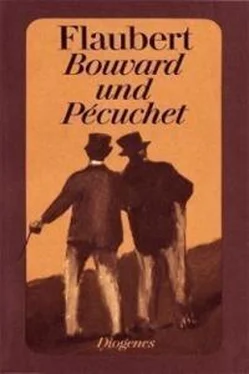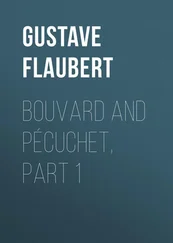Allevy transforms numbers into external objects, the number 1 being expressed by a tower, 2 by a bird, 3 by a camel, and so on. Pâris strikes the imagination by means of rebuses: an armchair garnished with clincher–nails will give "Clou, vis—Clovis"; and, as the sound of frying makes "ric, ric," whitings in a stove will recall "Chilperic." Fenaigle divides the universe into houses, which contain rooms, each having four walls with nine panels, and each panel bearing an emblem. A pharos on a mountain will tell the name of "Phar–a–mond" in Pâris's system; and, according to Allevy's directions, by placing above a mirror, which signifies 4, a bird 2, and a hoop 0, we shall obtain 420, the date of that prince's accession.
For greater clearness, they took as their mnemotechnic basis their own house, their domicile, associating a distinct fact with each part of it; and the courtyard, the garden, the outskirts, the entire country, had for them no meaning any longer except as objects for facilitating memory. The boundaries in the fields defined certain epochs; the apple trees were genealogical stems, the bushes battles; everything became symbolic. They sought for quantities of absent things on their walls, ended by seeing them, but lost the recollection of what dates they represented.
Besides the dates are not always authentic. They learned out of a manual for colleges that the birth of Jesus ought to be carried back five years earlier than the date usually assigned for it; that there were amongst the Greeks three ways of counting the Olympiads, and eight amongst the Latin of making the year begin. So many opportunities for mistakes outside of those which result from the zodiacs, from the epochs, and from the different calendars!
And from carelessness as to dates they passed to contempt for facts.
What is important is the philosophy of history!
Bouvard could not finish the celebrated discourse of Bossuet.
"The eagle of Meaux is a farce–actor! He forgets China, the Indies, and America; but is careful to let us know that Theodosius was 'the joy of the universe,' that Abraham 'treated kings as his equals,' and that the philosophy of the Greeks has come down from the Hebrews. His preoccupation with the Hebrews provokes me."
Pécuchet shared this opinion, and wished to make him read Vico.
"Why admit," objected Bouvard, "that fables are more true than the truths of historians?"
Pécuchet tried to explain myths, and got lost in the Scienza Nuova .
"Will you deny the design of Providence?"
"I don't know it!" said Bouvard. And they decided to refer to Dumouchel.
The professor confessed that he was now at sea on the subject of history.
"It is changing every day. There is a controversy as to the kings of Rome and the journeys of Pythagoras. Doubts have been thrown on Belisarius, William Tell, and even on the Cid, who has become, thanks to the latest discoveries, a common robber. It is desirable that no more discoveries should be made, and the Institute ought even to lay down a kind of canon prescribing what it is necessary to believe!"
In a postscript he sent them some rules of criticism taken from Daunou's course of lectures:
"To cite by way of proof the testimony of multitudes is a bad method of proof; they are not there to reply.
"To reject impossible things. Pausanias was shown the stone swallowed by Saturn.
"Architecture may lie: instance, the arch of the Forum, in which Titus is called the first conqueror of Jerusalem, which had been conquered before him by Pompey.
"Medals sometimes deceive. Under Charles IX. money was minted from the coinage of Henry II.
"Take into account the skill of forgers and the interestedness of apologists and calumniators."
Few historians have worked in accordance with these rules, but all in view of one special cause, of one religion, of one nation, of one party, of one system, in order to curb kings, to advise the people, or to offer moral examples.
The others, who pretend merely to narrate, are no better; for everything cannot be told—some selection must be made. But in the selection of documents some special predilection will have the upper hand, and, as this varies according to the conditions under which the writer views the matter, history will never be fixed.
"It is sad," was their reflection. However, one might take a subject, exhaust the sources of information concerning it, make a good analysis of them, then condense it into a narrative, which would be, as it were, an epitome of the facts reflecting the entire truth.
"Do you wish that we should attempt to compose a history?"
"I ask for nothing better. But of what?"
"Suppose we write the life of the Duke of Angoulême?"
"But he was an idiot!" returned Bouvard.
"What matter? Personages of an inferior mould have sometimes an enormous influence, and he may have controlled the machinery of public affairs."
The books would furnish them with information; and M. de Faverges, no doubt, would have them himself, or could procure them from some elderly gentleman of his acquaintance.
They thought over this project, discussed it, and finally determined to spend a fortnight at the municipal library at Caen in making researches there.
The librarian placed at their disposal some general histories and some pamphlets with a coloured lithograph portrait representing at three–quarters' length Monseigneur the Duke of Angoulême.
The blue cloth of his uniform disappeared under the epaulets, the stars, and the large red ribbon of the Legion of Honour; a very high collar surrounded his long neck; his pear–shaped head was framed by the curls of his hair and by his scanty whiskers and heavy eyelashes; and a very big nose and thick lips gave his face an expression of commonplace good–nature.
When they had taken notes, they drew up a programme:
"Birth and childhood but slightly interesting. One of his tutors is the Abbé Guénée, Voltaire's enemy. At Turin he is made to cast a cannon; and he studies the campaigns of Charles VIII. Also he is nominated, despite his youth, colonel of a regiment of noble guards.
"1797.—His marriage.
"1814.—The English take possession of Bordeaux. He runs up behind them and shows his person to the inhabitants. Description of the prince's person.
"1815.—Bonaparte surprises him. Immediately he appeals to the King of Spain; and Toulon, were it not for Masséna, would have been surrendered to England.
"Operations in the South. He is beaten, but released under the promise to restore the crown diamonds carried off at full gallop by the King, his uncle.
"After the Hundred Days he returns with his parents and lives in peace. Several years glide away.
"War with Spain. Once he has crossed the Pyrenees, victories everywhere follow the grandson of Henry IV. He takes the Trocadéro, reaches the pillars of Hercules, crushes the factions, embraces Ferdinand, and returns.
"Triumphal arches; flowers presented by young girls; dinners at the Prefecture; 'Te Deum' in the cathedrals. The Parisians are at the height of intoxication. The city offers him a banquet. Songs containing allusions to the hero are sung at the theatre.
"The enthusiasm diminishes; for in 1827 a ball organised by subscription proves a failure.
"As he is High Admiral of France, he inspects the fleet, which is going to start for Algiers.
"July 1830.—Marmont informs him of the state of affairs. Then he gets into such a rage that he wounds himself in the hand with the general's sword. The King entrusts him with the command of all the forces.
"He meets detachments of the line in the Bois de Boulogne, and has not a word to say to them.
"From St. Cloud he flies to the bridge of Sèvres. Coldness of the troops. That does not shake him. The Royal family leave Trianon. He sits down at the foot of an oak, unrolls a map, meditates, remounts his horse, passes in front of St. Cyr, and sends to the students words of hope.
Читать дальше








![Гюстав Флобер - Закат Карфагена [Сборник]](/books/414440/gyustav-flober-zakat-karfagena-sbornik-thumb.webp)


